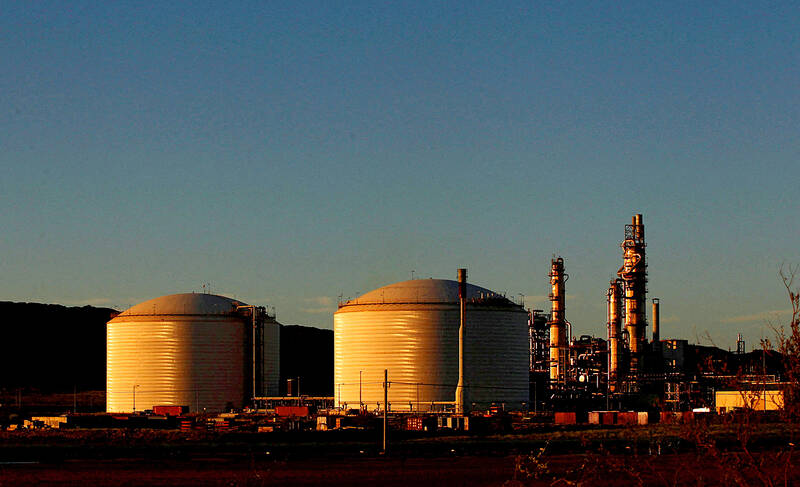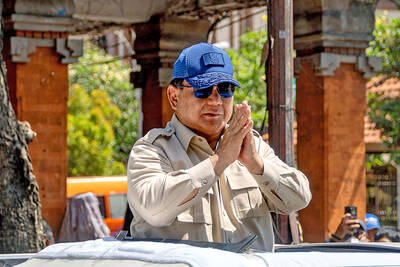Australia’s bid to secure UNESCO World Heritage status for a site with indigenous rock art has been dealt a blow after a UN advisory body warned it was at risk from nearby industrial pollution.
The International Council on Monuments and Sites (ICOMOS) advised UNESCO to refer the nomination back to the Australian government so it could “prevent any further industrial development adjacent to, and within, the Murujuga Cultural Landscape.”
Located on the Burrup Peninsula in Western Australia state, the Murujuga rock art, which is of cultural and spiritual significance to local indigenous Australians, was nominated for heritage listing in 2023.

Photo: Reuters
The Burrup Peninsula is also a key industrial hub, home to two gas plants run by Woodside, and fertilizer and explosives plants run by Norway’s Yara International.
The Australian government yesterday extended the lifetime of Woodside’s largest gas plant in the region, the North West Shelf, until 2070. The extension would generate up to 4.3 billion tonnes of additional carbon emissions.
Scrutiny over the impact of Australia’s resources industry on indigenous heritage sites has been magnified since Rio Tinto destroyed the Juukan Gorge rock shelters as part of a mine expansion in 2020.
Australia has said the Murujuga petroglyphs were in “good condition overall” and presented findings from a study of the site that said there were no suggestions “acid rain or deposition is contributing to damage of the rock art.”
Despite this, ICOMOS recommended preventing further industrial development near the site, and called for a “decommissioning and rehabilitation plan for existing industrial activities.”
ICOMOS, citing media reports quoting rock art experts and information received about the proposed North West Shelf extension, concluded that “the conservation conditions of the petroglyphs are extremely vulnerable and threatened by industrial acidic emissions.”
The ICOMOS draft decision was a “setback” for the Australian government, Deakin University cultural heritage expert Luke James said.
“ICOMOS has identified some concerns around protection and management,” James said. “It is now up to the Australian government to demonstrate to the committee that these are surmountable, or it will need to wait at least a year — and do further work — for another chance at inscription.”
Woodside in a statement said it continued to support the heritage listing of the rock art, and would work with the Murujuga traditional owners and government to prepare its response to ICOMOS’ recommendation.
“We believe the World Heritage nomination should proceed on the strength of the evidence and stand as proof that cultural heritage and industry can responsibly coexist when collaboration, transparency and rigorous scientific monitoring are in place,” it said.
The UNESCO World Heritage Committee is to meet in July.

DEADLOCK: Putin has vowed to continue fighting unless Ukraine cedes more land, while talks have been paused with no immediate results expected, the Kremlin said Russia on Friday said that peace talks with Kyiv were on “pause” as Ukrainian President Volodymyr Zelenskiy warned that Russian President Vladimir Putin still wanted to capture the whole of Ukraine. Meanwhile, US President Donald Trump said that he was running out of patience with Putin, and the NATO alliance said it would bolster its eastern front after Russian drones were shot down in Polish airspace this week. The latest blow to faltering diplomacy came as Russia’s army staged major military drills with its key ally Belarus. Despite Trump forcing the warring sides to hold direct talks and hosting Putin in Alaska, there

North Korea has executed people for watching or distributing foreign television shows, including popular South Korean dramas, as part of an intensifying crackdown on personal freedoms, a UN human rights report said on Friday. Surveillance has grown more pervasive since 2014 with the help of new technologies, while punishments have become harsher — including the introduction of the death penalty for offences such as sharing foreign TV dramas, the report said. The curbs make North Korea the most restrictive country in the world, said the 14-page UN report, which was based on interviews with more than 300 witnesses and victims who had

COMFORT WOMEN CLASH: Japan has strongly rejected South Korean court rulings ordering the government to provide reparations to Korean victims of sexual slavery The Japanese government yesterday defended its stance on wartime sexual slavery and described South Korean court rulings ordering Japanese compensation as violations of international law, after UN investigators criticized Tokyo for failing to ensure truth-finding and reparations for the victims. In its own response to UN human rights rapporteurs, South Korea called on Japan to “squarely face up to our painful history” and cited how Tokyo’s refusal to comply with court orders have denied the victims payment. The statements underscored how the two Asian US allies still hold key differences on the issue, even as they pause their on-and-off disputes over historical

CONSOLIDATION: The Indonesian president has used the moment to replace figures from former president Jokowi’s tenure with loyal allies In removing Indonesia’s finance minister and U-turning on protester demands, the leader of Southeast Asia’s biggest economy is scrambling to restore public trust while seizing a chance to install loyalists after deadly riots last month, experts say. Demonstrations that were sparked by low wages, unemployment and anger over lawmakers’ lavish perks grew after footage spread of a paramilitary police vehicle running over a delivery motorcycle driver. The ensuing riots, which rights groups say left at least 10 dead and hundreds detained, were the biggest of Indonesian President Prabowo Subianto’s term, and the ex-general is now calling on the public to restore their